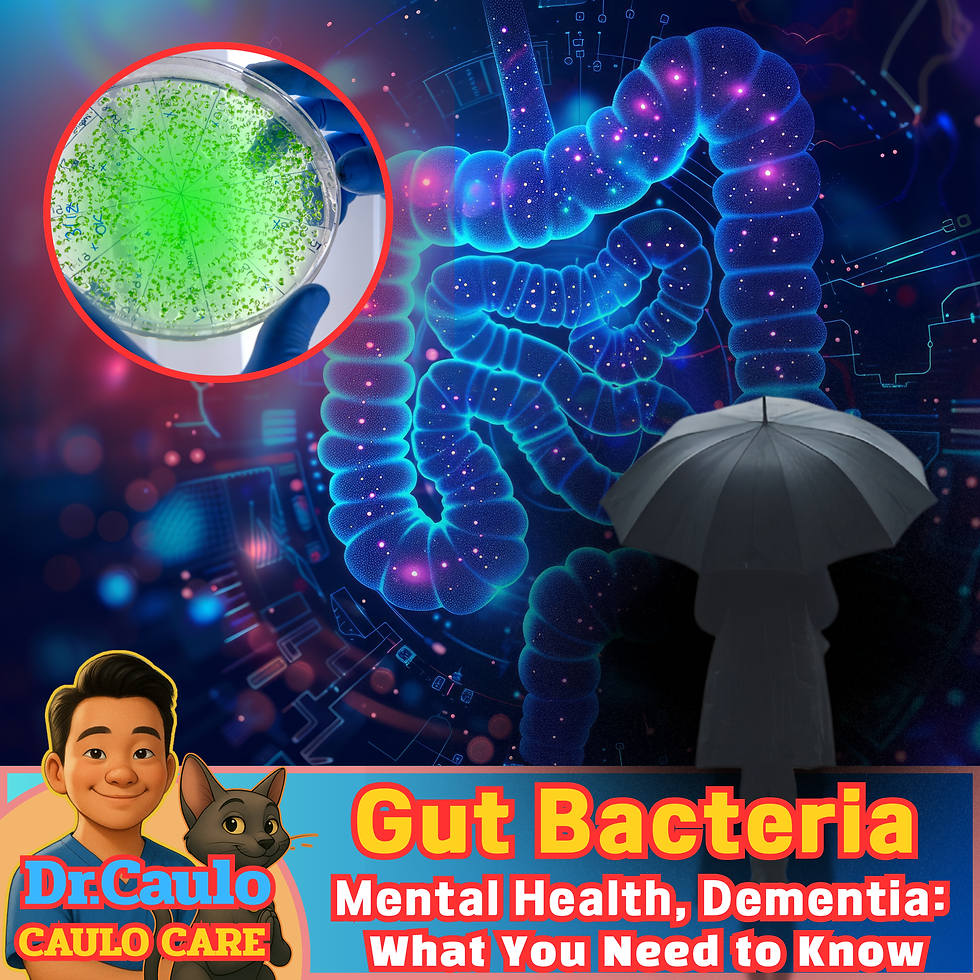Acupuncture for Depression and Anxiety: The Role of Gut Bacteria
- caulocare
- Aug 20, 2025
- 4 min read

By Dr. Phumlarp Caulo – Caulo Care Acupuncture, Forest Hills, New York
Introduction
Modern research shows a powerful link between the gut and the brain, often described as the gut-brain axis, explained by neuroscience. Studies now confirm that imbalances in gut bacteria (dysbiosis) are connected to depression, anxiety, and even dementia. This means that gut bacteria and depression are not separate issues but deeply connected, with direct implications for mood, memory, and long-term brain health.
Traditional Chinese Medicine (TCM) has long recognized this connection, describing the gut as central to emotional health and cognitive clarity. At Caulo Care Acupuncture in Forest Hills, we integrate modern medical insights with ancient wisdom to restore balance for both body and mind.
Causes in Western Medicine
Gut Microbiome Imbalance
Overgrowth of harmful bacteria and reduced diversity of beneficial bacteria.
Strongly linked to chronic inflammation, oxidative stress, and neurotransmitter imbalances.
Inflammation and Leaky Gut
A weakened intestinal lining allows toxins to enter the bloodstream, triggering systemic inflammation.
Chronic inflammation is associated with neurodegenerative diseases such as Alzheimer’s and Parkinson’s, making gut health and dementia prevention a critical focus.
Neurotransmitter Disruption
90% of serotonin, the “happiness hormone,” is produced in the gut.
Dysbiosis can reduce serotonin and dopamine levels, worsening depression and anxiety.
This is why modern research often highlights the value of probiotics and mental health as part of holistic treatment.
Causes in Traditional Chinese Medicine (TCM)
From the TCM perspective, digestion and emotional health are governed by the Spleen and Stomach system.
Spleen Qi Deficiency → fatigue, worry, poor concentration, loose stools.
Dampness and Phlegm → accumulation that clouds the mind (Shen), causing brain fog, depression, and memory decline.
Liver Qi Stagnation → emotional stress blocks Qi, disrupting digestion and mood.
This traditional framework parallels modern findings, supporting the idea that poor gut health leads to mental and cognitive imbalance. For centuries, TCM for depression and anxiety has addressed these root causes naturally.
Posture & Anatomy/Physiology Connection
Posture and Gut Function
Slouching compresses abdominal organs, slowing peristalsis and blood circulation.
Poor spinal alignment can influence vagus nerve activity, reducing gut-brain communication.
A&P Note
The vagus nerve is the main highway of the gut-brain axis.
Poor posture, shallow breathing, and stress impair vagal tone, worsening gut dysfunction and mood disorders.
This is why vagus nerve acupuncture in NYC has gained attention as a natural way to regulate the gut-brain connection.
Treatments – Western Medicine
Medications: Antidepressants (SSRIs, SNRIs), anti-inflammatory supplements (Omega-3, Vitamin D).
Probiotics and prebiotics: Under active research for mental health and brain health improvement.
Lifestyle: High-fiber diet, fermented foods, regular exercise, mindfulness, and sleep hygiene.
Treatments – Traditional Chinese Medicine
Acupuncture
Acupuncture has been shown to regulate vagus nerve function, reduce stress, and improve gut-brain communication. At our Forest Hills acupuncture clinic, we use targeted points such as ST36 (Zusanli), CV12 (Zhongwan), SP6 (Sanyinjiao), and LR3 (Taichong) to harmonize digestion and calm the mind. This approach positions acupuncture as one of the most effective natural remedies for brain health.
Herbal Medicine
Ban Xia Hou Po Tang: clears phlegm and relieves emotional stagnation.
Gui Pi Tang: strengthens Spleen Qi, eases anxiety, improves memory.
Chai Hu Shu Gan San: moves Liver Qi, easing depression and digestive discomfort.
Tui Na & Qi Gong
Posture correction, abdominal massage, and breathing exercises improve circulation and gut vitality.
Prevention and Self-Care
Dietary Tips
Increase prebiotic foods (garlic, onion, asparagus).
Eat more probiotics (yogurt, kimchi, miso).
Limit processed sugar and alcohol.
Lifestyle Habits
Practice upright posture and diaphragmatic breathing.
Exercise daily to support gut motility.
Manage stress with meditation, tai chi, or yoga.
Clinic Care
Regular acupuncture sessions for gut-brain balance.
Herbal consultations tailored to individual patterns.
Education on lifestyle and nutrition to sustain long-term mental and cognitive health.
Conclusion
Gut health is not just about digestion—it shapes emotions, cognition, and long-term brain health. By understanding the gut-brain axis explained through modern science and TCM, we can prevent and treat depression, anxiety, and dementia at their root.
At Caulo Care Acupuncture in Forest Hills, New York, we guide patients through a holistic journey that integrates acupuncture for mental health New York, TCM for depression and anxiety, probiotics and mental health, and vagus nerve acupuncture NYC into a personalized plan for healing.
Your gut is your second brain—nurture it, and it will protect both your mood and your memory.
This information is only educational and should not be construed as medical advice.
Everything must be balanced, and the suggestions may not apply to you.
A specialist doctor should be consulted for any medical advice or diagnosis.
BOOK AN APPOINTMENT NOW!
Acupuncture near me at Forest Hill, NY
🔶🔷🔶🔷🔶🔷🔶🔷🔶🔷🔶🔷
Dr. Phumlarp Caulo LA,c, MAc. OM, DAHM
Doctor of Acupuncture/Chinese Medicine
Caulo Care Acupuncture
🔖 By appointment only
☎️+1 (929) 269-4549




Comments